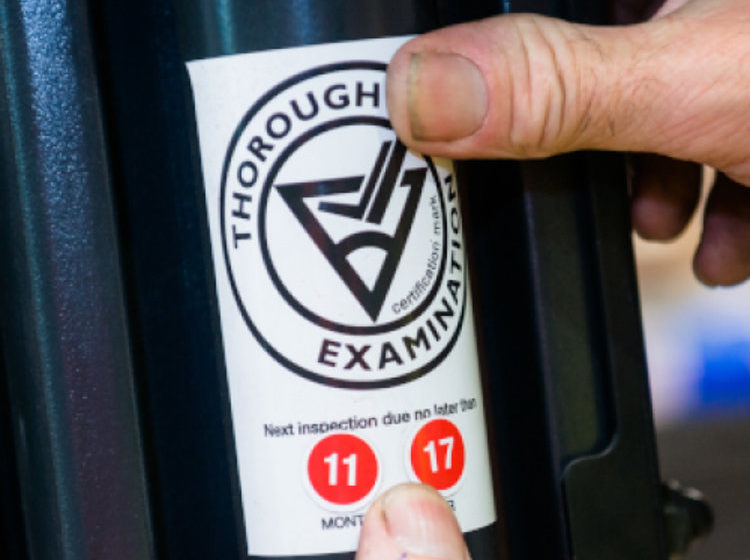As members of the Forklift Truck Association (FLTA) and the Consolidated Fork Truck Services (CFTS) Lister Lift Trucks recognises the requirement to regulate the standard of all forklift services and the need for a quality-controlled standard for the inspection of forklift trucks providing peace of mind that their operations are safe, legal and productive and we are consistently working to provide an excellent service for all of our customers.
The Consolidated Fork Truck Services (CFTS) works in close consultation with the HSE to ensure that agreed standards are met for the inspection of equipment. PUWER and LOLER regulations legally require all lift trucks to have a valid Report of Thorough Examination, there was no guidance on how this should be reported until 2004 when the CFTS was formed.
The Industry Standard
Since 2004, CFTS has been the adopted standard for Thorough Examinations. CFTS was created by the FLTA and BITA – in close consultation with the HSE – to solve a vital problem facing work equipment users.
A lack of national standards meant that historically there was no consistency between equipment inspections and there was a high risk of corners being cut. Owners could not be confident that their trucks were legal or safe to use.
PUWER and LOLER regulations legally require all lift trucks to have a valid Report of Thorough Examination – but there was little official guidance about what this should cover.
To provide clarity, the materials handling industry’s major trade associations worked together to give clear, definitive procedures and consistent national standards for a safe and genuine Thorough Examination.
The result is CFTS: the national accreditation scheme for Thorough Examination, specifically for companies who service work equipment.
CFTS serves owners and users of equipment throughout a wide variety of industries, including agriculture, construction, materials handling and logistics. If you own and operate work equipment, such as telehandlers, tractors, forklifts, man-up vehicles or stackers, you need CFTS.
Look for the distinctive CFTS mark: it’s your guarantee that a Thorough Examination is full and valid under law and will be carried out by a fully trained engineer in accordance with strict quality procedures.
Without it, your Thorough Examination Report may not be worth the paper it’s printed on.
CFTS NEWS
5 THINGS TO LOOK FOR IN AN MEWP THOROUGH EXAMINATION
Most operators of Mobile Elevating Work Platforms (MEWPs) are mindful of their responsibilities in arranging regular safety inspections.
But far fewer are aware that many inspection providers use a generic checklist which fails to inspect components specific to MEWPs… potentially putting an employer on the wrong side of the law.
Here’s why.
The law states that under LOLER regulations, an MEWP should undergo a Thorough Examination at east every 6 months to ensure that equipment is not faulty and doesn’t pose a risk to staff.
Sounds straightforward, but many Thorough Examinations focus solely on LOLER, ignoring the PUWER component of the inspection, an omission that could lead to accidents, injuries, damage, downtime, disruption and possible prosecution.
“In some ways, an incomplete inspection is worse than none at all, as it could give a false sense of security,” explains Geoff Martin Chairman of Thorough Examination accrediting body CFTS.
“To help owners and operators of MEWPs meet their safety obligations and comply fully with the law, we have come up with 5 tips that will help them review their existing arrangements.”
5-point guide for effective MEWP Thorough Examinations
- Does your provider employ MEWP Thorough Examination documentation including a dedicated MEWP checklist created specifically for this kind of equipment? CFTS examiners never take a “once size fits all” approach to different types of workplace equipment.
- Crucially, does the provider’s documentation meet the requirements of both LOLER and PUWER – i.e., does it cover important areas such as brakes and steering as well as the lifting gear (many don’t).
- Is your examiner both a ‘competent person’ and an experienced engineer? And do they carry the kit to check your MEWP thoroughly? (Including trolley jack, A-frame ladders and dedicated chain-gauge).
- Is your Thorough Examination fully and independently audited? Does the inspector undergo regular refresher training – so you can rest assured they are up to date with the latest legislation?
- Is your examiner able to minimise disruption to your operations? Many CFTS-accredited engineers are equipped to carry out repairs so, in the event of a fault, it can be fixed without delay, keeping you operational.

